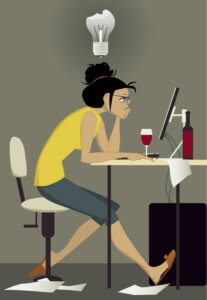 Back in high school, I watched people transform from shy wallflowers to social butterflies by drinking. They grew talkative and tried things they would never have done sober. Being under the influence didn’t truly help them, although they swore it did.
Back in high school, I watched people transform from shy wallflowers to social butterflies by drinking. They grew talkative and tried things they would never have done sober. Being under the influence didn’t truly help them, although they swore it did.
Being under the influence doesn’t help a writer’s creativity either. [And that includes many other things we’re dependent on for dopamine hits, including sugar, chocolate, and Netflix bingeing.]
Why do we binge on our favorite things when the words are slow to come? Do we somehow think it will speed things up and make the words flow better? That has been the folklore surrounding many famous writers in the past.
Mental Evacuation
Recently I re-read one of the very best books on writing that I own. If You Want to Write by Brenda Ueland is a classic. In one chapter she talked about how creative words and our really good ideas come slowly–and how impatient writers try to “hurry” the words in unproductive, artificial ways.
writing that I own. If You Want to Write by Brenda Ueland is a classic. In one chapter she talked about how creative words and our really good ideas come slowly–and how impatient writers try to “hurry” the words in unproductive, artificial ways.
“…good thoughts come slowly. And so it is nothing for you to worry about or to be afraid of, and it is even a bad plan to hurry them artificially. For when you do so, there may be suddenly many thoughts, but that does not mean that they are especially good ones or interesting. It is just as when you give a thoughtful, slightly tired person a stiff drink. Before the drink, he says nothing but what seems to him interesting and important. He mentally discards the thoughts that are not important enough to make up for the fatigue of saying them. But after the drink, all his thoughts come out head over heels, whatever crosses his mind. There are suddenly many thoughts; but they are just like the flutter of thoughts that come out of one of those unfortunate people who cannot keep from talking all the time. This kind of talking [or writing, I might add] is not creation. It is just mental evacuation.”
Drug of Choice
Although I never drank, I had my own stimulants to shift my mind into gear. I wasn’t a coffee drinker or smoker, but at one point in my early days of writing when my four children were very young, I had a four-candy-bar-a-day habit, and my day started with two Diet Cokes. When I got bogged down and blocked and didn’t know what to write next, a sugar rush and caffeine jolt could get me producing again. It took me years to see that the quality of the writing suffered during such times.
Ueland quotes Tolstoy (Anna Karenina, War and Peace) on this subject of being quiet and thinking, and waiting for the words and “tiny, tiny alterations of consciousness” to come:
“It is at such times that one needs the greatest clearness to decide correctly the questions that have arisen, and it is just then that one glass of beer, or one cigarette [or candy bar or donut or Coke, I might add] may prevent the solution of the question, may postpone the decision, stifle the voice …”
Creativity Rewarded by Quiet Patience
We get in such a hurry to write, to revise, to submit. When the words don’t come quickly, we use stimulants to force the issue, and often end up with something (Ueland calls) “superficial and automatic, like children yelling at a birthday party,” not something tried and tested and true.
I know I’ve been guilty of this “hurry” habit with my writing in the past, but yesterday I made a conscious effort NOT to do so. I gave it time, and when the words didn’t come readily, I waited (instead of making my usual trip to the fridge or to check out Britbox.) It was uncomfortable at times. But I ended up writing for over two solid hours without interruption, and I’m excited about what I wrote. It may not be War and Peace, but it’s not “superficial and automatic” either.
What do you consider a healthy creative life? Is it hard for you to write without artificial help? Does being under the influence of something affect your writing–or had you thought about it? Try writing “with” and “without,” and see if it makes a difference.




